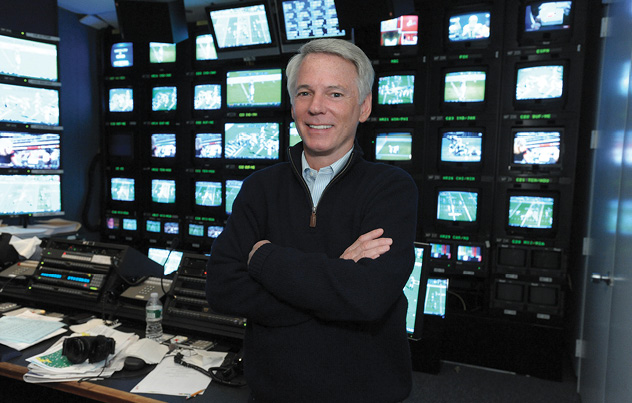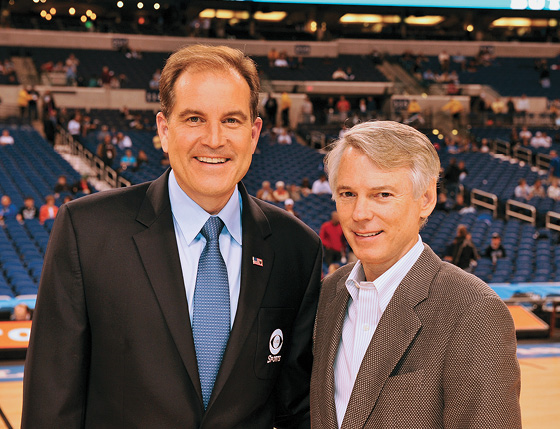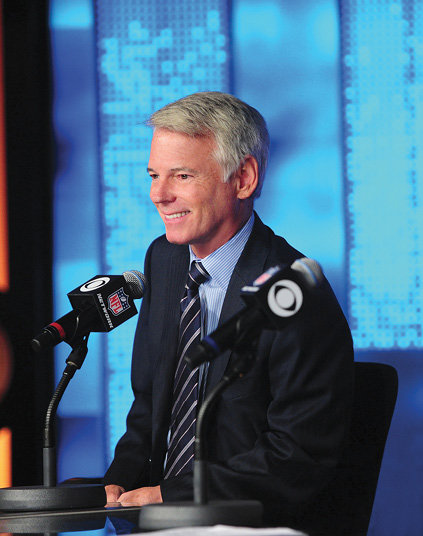- Home
- Media Kit
- Current Issue
- Past Issues
- Ad Specs-Submission
- Ad Print Settings
- Reprints (PDF)
- Photo Specifications (PDF)
- Contact Us

![]()
ONLINE

The Business of Sports

Sean McManus in the CBS Broadcast Center
control room, where he oversees the Network’s live broadcasts
Editors’ Note
Sean McManus was named to his current post in February 2011. He also serves as Executive Producer of THE NFL ON CBS. McManus served concurrently as President, CBS News and Sports for more than five years prior to being named Chairman. He was named President, CBS Sports, in November 1996 and President, CBS News, in October 2005 and is only the second person to hold both Division titles simultaneously. McManus is a 12-time Emmy Award-winner. In 2015 he was named to The Hollywood Reporter’s list of The 35 Most Powerful People in Media and was also honored with the Legacy Award at the Cynopsis Sports Media Awards. During his more than 19 years as Chairman and President of the Division, CBS Sports has become the year-round leader in network sports television. Prior to his CBS Sports tenure, he was Senior Vice President of U.S. Television Sales and Programming for Trans World International, the television division of International Management Group. Before that, he was Vice President, Program Planning and Development at NBC Sports, becoming the youngest vice president in the history of the network at the age of 27. McManus joined NBC Sports in 1979 as an associate producer assigned to the NFL, Wimbledon, the PGA TOUR, “Sportsworld,” auto racing, and the Tour de France. He began his career in 1977 at ABC Sports as a production assistant and associate producer. In 2010, he was inducted into the Broadcasting & Cable Hall of Fame. He will be inducted into the Sports Broadcasting Hall of Fame in December 2016. McManus graduated cum laude from Duke University with a degree in English and History.
Company Brief
CBS Sports (cbssports.com) is the sports division of CBS with premier sports properties including the NFL, Southeastern Conference (SEC) football, NCAA basketball (including telecasts of the NCAA Men’s Basketball Tournament), and PGA Tour golf, including The Masters, and the PGA Championship.
Will you talk about growing up within a sports focused environment and did you always know it’s where you wanted to be?
I did, and I started working for ABC Sports when I was probably 10 years old – sweeping out the truck and getting sodas for the production team, and then handling scoring on golf events.
I knew by the time I was in college what I wanted to do. Having grown up around the men and women of ABC Sports and having seen what that life was like, it was an easy choice for me.
I did have an internship at Salomon Brothers my junior year, which my mother wanted for me and it was the hot Wall Street firm at the time. I came back from that knowing I could make a lot of money there but compared to the world of sports television, I was going to be bored.
I did a lot of freelance work while in college for ABC Sports. I got hired right out of Duke University, and I have known always that was where I wanted to make my living. It has worked out very well.
I still love the industry. It has changed a lot since I got into it when there were three television sports networks and nothing else – no Fox Sports or ESPN or the Internet. It was a closed, insular world where everybody knew each other.
I went from ABC to NBC fairly early in my career. I felt it was important to get out from underneath the shadow of my father (Jim McKay). I had a terrific career at NBC. I thought I would have a lifelong career there and I ran into Mark McCormack at Wimbledon and he said that his company, International Management Group, was doubling in size almost every year; TWI, which was their television division, was the largest division and the fastest growing one, and he said I would have an opportunity to be a strong number-two there and to run it one day. It was an opportunity I could not turn down.
I left the comfort of NBC Sports and went a more entrepreneurial route, and became a seller of sporting events as opposed to a buyer of sporting events, representing the television rights to the networks for the Orange Bowl, Wimbledon, the British Open, and Major League Baseball.
Unexpectedly, Peter Lund offered me the job to run CBS Sports. I had always wanted to run a sports network. It was the only job that I would have left IMG for.

Sean McManus with acclaimed CBS Sports play-by-play
announcer Jim Nantz
In such a competitive market, what been the secret to the success for CBS Sports?
We’ve really tried to manage and maintain close relationships, be it with the folks at Augusta National or the NFL, the NCAA, the PGA Tour, PGA of America, etc.
We’ve done a really good job of monetizing and programming and producing our properties so they’ve been very successful on television. We have been very cognizant of the bottom line, which isn’t always true in sports television. We have passed on deals we feel aren’t good for us. We’ve also been incredibly disciplined in concentrating on a few of the biggest events in sports television and not losing our focus by buying a lot of events that might not work for us financially, as well as really being focused on the events that we do program.
How critical is it for an organization like CBS Sports to have an innovative culture and how important is it to communicate the value of that to your people?
I’ve tried to instill in everyone in the division that change is really important and if it’s for the better, it’s a really good thing. Also, to not be afraid to try new things, be it in technology or in production techniques, or even in on-air talent, to try to break the mold.
We do anywhere from four to seven NFL games every single Sunday in the fall, and I’ve challenged our people to ask that in only going to 10 percent of the country, what can we do in our game to make it stand out, in terms of isolated replays, graphics, or an opening? We’ve really run the division as a meritocracy and those who have done well are those who have innovated, who have changed, and who haven’t been afraid to try new things. People know that is part of their report card – how well they innovate.
Be it through SwingVision in golf or high-definition television when it first came about or the EyeVision 360 view that we won the Emmy for in the Super Bowl, we have more than held our own in the area of new technology and we’ll continue to do so.
We probably don’t publicize the technology we have developed as well as we should, and we’re working on that, but I would stack up our technical innovations against anybody in the industry.

Sean McManus speaking at a media event, promoting
CBS’s NFL coverage, including its joint Thursday Night Football
package with the NFL Network
Are you surprised anymore or do you just know when something is going to work?
If there is a sure thing it’s the ratings for NFL Football. Be it at nighttime or in the afternoon, it’s going to draw an enormous audience – it’s just a question of how enormous that audience is going to be.
Twenty-nine of the top 30 shows in this past television season were NFL programs, so it’s must-have television. We did the final game between Peyton Manning and Tom Brady for the AFC Championship game last season, and even I was blown away by the numbers.
The NFL ratings will continue to be high until overexposure becomes an issue and there is no indication yet that people are tiring of the increased windows or new programming that is put on around NFL. It seems to be bulletproof when it comes to big ratings and viewer interest. It’s a sport that draws interest 365 days per year. There is always NFL news, be it the draft or combines, or off-field happenings.
I’m still surprised at some of the rights fees being paid for some of the properties out there. There have been some deals I’ve looked at and thought someone must have seen something I hadn’t seen. I’m not second-guessing those deals but I’ve been surprised by some of the recent increases that I’ve seen for some of the properties.
What about the impact of March Madness?
It gets bigger and bigger each time in terms of being a cultural and societal event, in that everybody seems to have an office or personal pool in their family. People who don’t care about college basketball all year long suddenly try to figure out if Duke is going to make it through the first round. It’s remarkable how that event really takes over the country, much more so than even the television ratings indicate.
We just finished renewing that event into the year 2032. The ratings will fluctuate each year, but it’s a sure thing it will captivate the American public almost like no other multi-day event does throughout the year.
How has the PGA Tour changed and evolved over the years?
We were all wondering what would happen when Tiger Woods was no longer a factor and we are very fortunate that golf is as healthy as it has been in decades, from a player personality standpoint, be it via Ricky or Jordan or Justin or Rory. We only have to use their first names, which is an indication of what kind of status they have reached. Corporate sponsorship is at an all-time high; the PGA Tour is renewing deals for many years down the road and all the events have a great sponsor underpinning. There is real interest in these players, which is reflected in the television ratings and in our advertising sales, so golf is very well-positioned.
In terms of its image, the sport gives so much money back to communities in terms of charitable contributions. The charity component is incredibly important for every single PGA Tour event. It reflects well on the players, on the tour, and on the advertisers and sponsors who associate themselves with the tour.
The athletes are friendly and interact with the fans, and they’re all different personality-wise. By and large, they’re outstanding human beings, as well as being champion golfers.
You’ve invested a lot in the CBS Sports site and online. How critical has that outlet been?
It’s increasingly important. The digital space is becoming easier to monetize but it’s still dwarfed by network advertising. With the Super Bowl, for example, the amount of revenue generated in broadcast television is quantumly more within advertising, but the digital element is getting closer and closer.
The new technology is an increasingly important avenue to reach younger viewers, as is social media outlets like Facebook, Instagram, and Snapchat. Millennials are consuming media this way.
I still believe there is a very important position in front of a big screen color television for a majority of our audience, but we don’t have our head in the sand and we realize we also have to reach the younger audience who is consuming media in a whole different way.
What has made the relationship between you and Les Moonves (Chairman, President, and CEO, CBS Corporation) work so well?
A mutual respect and an incredible loyalty on both of our parts. The one thing Leslie expects and deserves more than any other quality is loyalty. I have said happily that he’s the last boss I’ll ever have. He’s an amazing executive who knows everything we’re doing in sports just like he knows everything about what’s going on in news, entertainment, syndication, and interactive. He’s incredibly engaged, a big sports fan, intimately involved in all of our big negotiations, and we just have a real simpatico. I’m the luckiest guy in the world to work for him.
What was it like having an industry legend for a father and how critical was the relationship with him in shaping who you are?
It’s the most critical of any relationship I’ve had. A day doesn’t go by that I don’t think of some lesson my father taught me or some perspective I learned from him. He was a great storyteller, both on and off of television. He was very diverse in his interests, but he instilled in me a respect for integrity and honesty, and used to remind me that the camera never lies. The camera spots a phony instantaneously, and that is true in business as well. People will know if someone is a phony. He also had a really good feel for sports television. We used to talk every weekend about the job that ABC was doing or that we were doing, and we talked about life and the industry and my career. He was especially proud when I got the news job because I carved out a niche for myself in the sports world as well as only the second person in history to hold those two jobs at the same time; the other one being my dad’s mentor, Roone Arledge. To know that I was in charge of such a robust and incredibly tradition-rich entity like CBS News is amazing. My father was as proud of that as anything I’ve ever done in the sports world.•